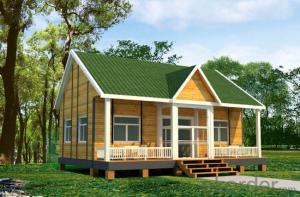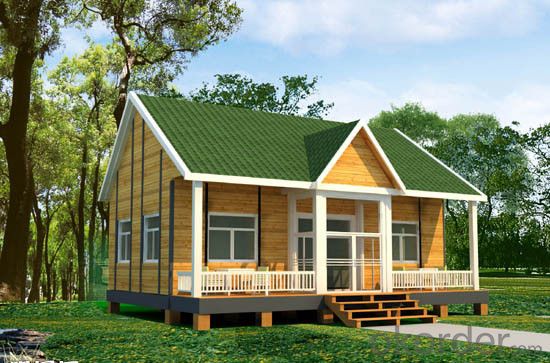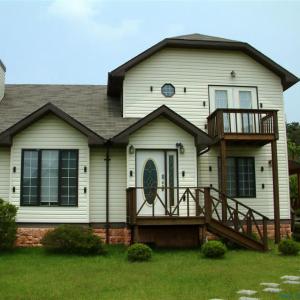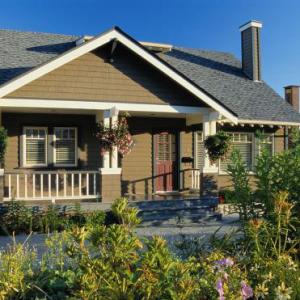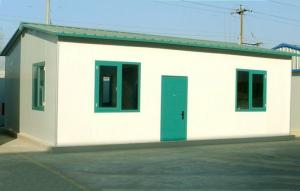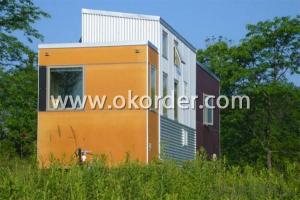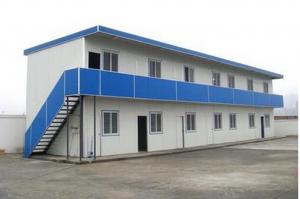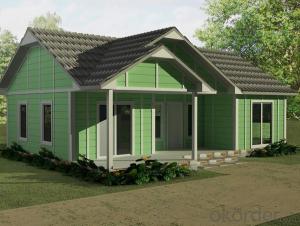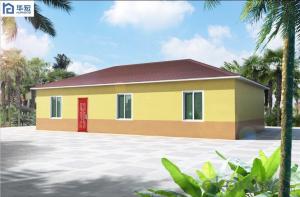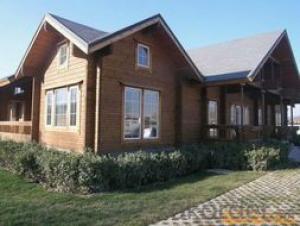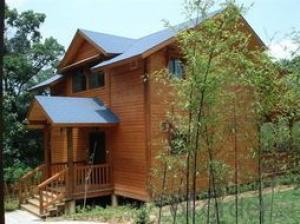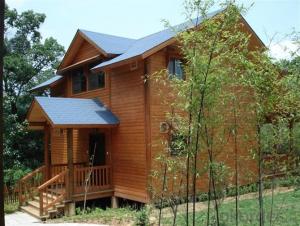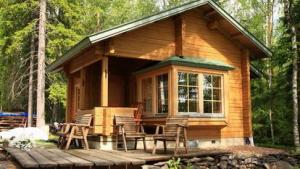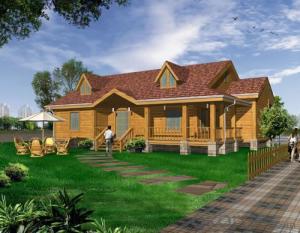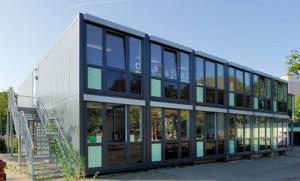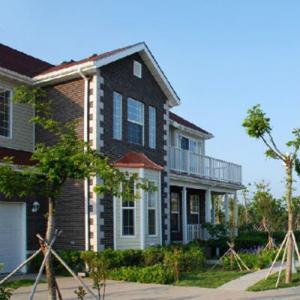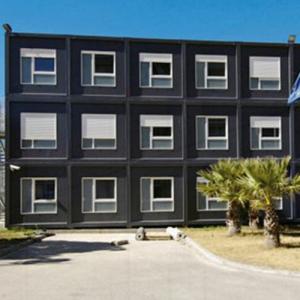Wooden house and garden house
- Loading Port:
- China Main Port
- Payment Terms:
- TT OR LC
- Min Order Qty:
- -
- Supply Capability:
- -
OKorder Service Pledge
Quality Product, Order Online Tracking, Timely Delivery
OKorder Financial Service
Credit Rating, Credit Services, Credit Purchasing
You Might Also Like
wooden villa house Wooden house and garden house
Specifications
New Design Two-story Prefabricated Living Wooden House
1).Good quality and best price
2).Insects-resistant, moisture proof
- Q: Villa room function how to divide the most appropriate?
- Garage, entrance, TV room, restaurant, living room, kitchen, kitchen, breakfast room, bathroom, bedroom, master bedroom, study,
- Q: How to build self-built villa?
- Second, apply for land to build land, it is best miscellaneous. Agricultural land to the first agricultural specia
- Q: Are container houses suitable for small business premises?
- Small business premises can indeed be suitable for container houses. These houses have gained popularity in recent years due to their affordability, sustainability, and versatility, making them an excellent choice for small businesses seeking cost-effective solutions. There are several benefits that container houses offer for small businesses. Firstly, they are considerably cheaper compared to traditional brick and mortar buildings, making them accessible to entrepreneurs with limited budgets. Furthermore, container houses can be modified and customized to meet specific business needs, providing flexibility in terms of layout and design. Another advantage is that container houses are highly portable and can be easily relocated if necessary. This feature is particularly beneficial for small businesses that may need to change locations frequently or expand their operations in the future. Moreover, container houses are eco-friendly as they repurpose shipping containers that would otherwise go to waste. By opting for a container house for their business premises, small business owners can contribute to sustainable practices and reduce their carbon footprint. However, it is important to consider certain factors when determining the suitability of container houses for small business premises. The limited space inside a container house may not be appropriate for businesses requiring larger working areas or significant storage needs. Additionally, insulation and climate control should be taken into account to ensure a comfortable working environment, especially during extreme weather conditions. In conclusion, container houses can be a suitable choice for small business premises, offering affordability, flexibility, and sustainability. Nonetheless, small business owners should carefully evaluate their specific needs and requirements before making a decision.
- Q: What are the advantages of the container house?
- First, easy to transport, especially for the frequent replacement of construction units;
- Q: Can container houses be designed with a balcony or patio?
- Container houses have the potential to include a balcony or patio in their design. Typically, containers themselves lack these features, but they can be modified and personalized to incorporate them. By extending the structure or creating platforms, balconies and patios can be added to container houses, providing residents with outdoor living spaces. This allows homeowners to relish the advantages of outdoor living, including fresh air, sunlight, and a place to unwind or entertain guests. Moreover, the design of the balcony or patio can be customized to fit the homeowner's aesthetic preferences and functional requirements. Consequently, container houses offer a versatile and adaptable choice for individuals seeking outdoor living spaces.
- Q: Are container houses resistant to mold or mildew?
- Container houses can be resistant to mold or mildew if proper precautions and maintenance are followed. The key factor in preventing mold or mildew growth is moisture control. Since containers are made of metal, they are naturally resistant to moisture penetration. However, if there are any leaks or gaps in the container, moisture can seep in and create a conducive environment for mold or mildew to grow. To ensure resistance to mold or mildew, it is recommended to properly seal and insulate the container to prevent any moisture from entering. This includes sealing any gaps or holes, properly insulating the walls, and installing a vapor barrier to control humidity levels. Additionally, proper ventilation is crucial to prevent the buildup of moisture inside the container. Regular maintenance is also essential to prevent mold or mildew growth. This includes routinely checking for any leaks or damages, promptly repairing them, and ensuring proper airflow and ventilation within the container. Regular cleaning and disinfection of the interior surfaces can also help prevent the growth of mold or mildew. It is important to note that while container houses can be resistant to mold or mildew, it ultimately depends on the materials used, construction techniques, and maintenance practices. Consulting with professionals and following proper guidelines can help ensure that container houses remain resistant to mold or mildew.
- Q: Are container houses resistant to corrosion or rust?
- Container houses are generally resistant to corrosion or rust due to their construction with corten steel. This particular type of weathering steel contains elements like copper, chromium, and nickel, which create a protective layer when exposed to the elements. This layer serves as a barrier against corrosion and rust, ensuring the longevity and durability of container houses. Additionally, anti-corrosion coatings are often applied to the steel used in container houses to further enhance its resistance to rust. However, it is crucial to note that proper maintenance and regular inspections are still necessary to preserve the integrity of the container house, particularly in coastal or highly humid regions where the risk of corrosion may be elevated.
- Q: Are container houses resistant to wildfires or forest fires?
- Container houses can be resistant to wildfires or forest fires, but it depends on several factors. The materials used to build the container house play a crucial role in its resistance. Shipping containers are typically made of steel, which is a non-combustible material and can withstand high temperatures. This makes them more resistant to catching fire or being severely damaged by flames. However, it is important to note that container houses still need to be properly insulated and have fire-resistant features to enhance their resistance to wildfires. These features can include fire-resistant coatings, fireproof insulation materials, and fire-rated windows and doors. Additionally, the surrounding environment and vegetation can also influence the level of fire resistance. If a container house is located in an area with a high risk of wildfires, it is recommended to take additional precautions, such as clearing vegetation around the house and creating a defensible space. Overall, while container houses have the potential to be resistant to wildfires, it is crucial to ensure that proper fire-resistant measures are in place during construction and to take necessary precautions depending on the surrounding fire risk.
- Q: Are container houses suitable for student accommodation?
- Indeed, container houses can serve as a viable choice for student accommodation. They possess several merits that render them appealing to students. Firstly, container houses prove cost-effective in comparison to traditional housing alternatives, a crucial aspect for students who often possess limited budgets. They can be procured or rented at a reduced expense, thereby constituting a more economical alternative. Secondly, container houses boast high degrees of customization, allowing for their transformation into cozy living spaces. With suitable modifications, these houses can encompass all the essential amenities, including bedrooms, bathrooms, kitchens, and study areas. By optimizing space utilization, these structures can furnish a comfortable living environment for students. Furthermore, container houses present the advantage of being portable, facilitating easy relocation if necessary. This flexibility proves advantageous to students who may frequently need to move, be it due to university transfers, internships, or other reasons. By enabling transportation to different locations, container houses offer a convenient solution for student accommodation. Moreover, container houses demonstrate an eco-friendly nature, given that they are constructed from recycled shipping containers. Consequently, they represent a sustainable and environmentally conscious choice for student housing. As the emphasis on sustainability continues to grow, container houses align with the values of numerous students concerned about the environment. However, it is crucial to acknowledge potential drawbacks as well. Container houses may possess limited insulation, potentially necessitating additional heating or cooling measures. They might also present restricted space in comparison to traditional houses, which could pose a concern for students requiring more room. Additionally, the availability of land and requisite permits for container houses can vary depending on the location, potentially posing challenges for student accommodation. In conclusion, container houses offer a fitting option for student housing due to their affordability, customizability, portability, and eco-friendliness. While certain limitations should be considered, these houses present a practical and sustainable solution for students seeking affordable and flexible housing alternatives.
- Q: Are container houses suitable for tiny homes?
- Yes, container houses are suitable for tiny homes. Container houses, also known as shipping container homes, are increasingly being used as an affordable and sustainable option for tiny homes. They are made from repurposed shipping containers, which are sturdy, durable, and readily available. Container houses offer several advantages for tiny homes. Firstly, they are highly customizable and can be designed to meet specific needs and preferences. The containers can be modified and combined in various ways to create a unique and functional living space. Additionally, container homes can be easily expanded or downsized by adding or removing containers as required, providing flexibility for changing needs. Container houses are also cost-effective. Compared to traditional construction, building a container home can be significantly cheaper. The cost of purchasing and modifying containers is generally lower than building a conventional house, making them an attractive option for those on a limited budget. Furthermore, container homes are energy-efficient and environmentally friendly. The repurposing of shipping containers reduces waste and minimizes the use of new materials. In terms of livability, container houses can provide comfortable and functional living spaces. With proper insulation, ventilation, and interior design, container homes can offer a cozy and aesthetically pleasing environment. The compact size of containers is well-suited for tiny homes, as it encourages minimalistic living and efficient use of space. However, it is important to consider some limitations of container houses for tiny homes. One major challenge is the need for insulation to regulate temperature and minimize condensation. Proper insulation is crucial to maintain a comfortable indoor environment, especially in extreme climates. Additionally, the limited width of shipping containers may require creative interior design solutions to maximize space utilization. Overall, container houses are a suitable option for tiny homes, offering affordability, sustainability, and versatility. With careful planning and design considerations, container homes can provide a comfortable and stylish living space while promoting a minimalist and eco-friendly lifestyle.
Send your message to us
Wooden house and garden house
- Loading Port:
- China Main Port
- Payment Terms:
- TT OR LC
- Min Order Qty:
- -
- Supply Capability:
- -
OKorder Service Pledge
Quality Product, Order Online Tracking, Timely Delivery
OKorder Financial Service
Credit Rating, Credit Services, Credit Purchasing
Similar products
Hot products
Hot Searches
Related keywords
